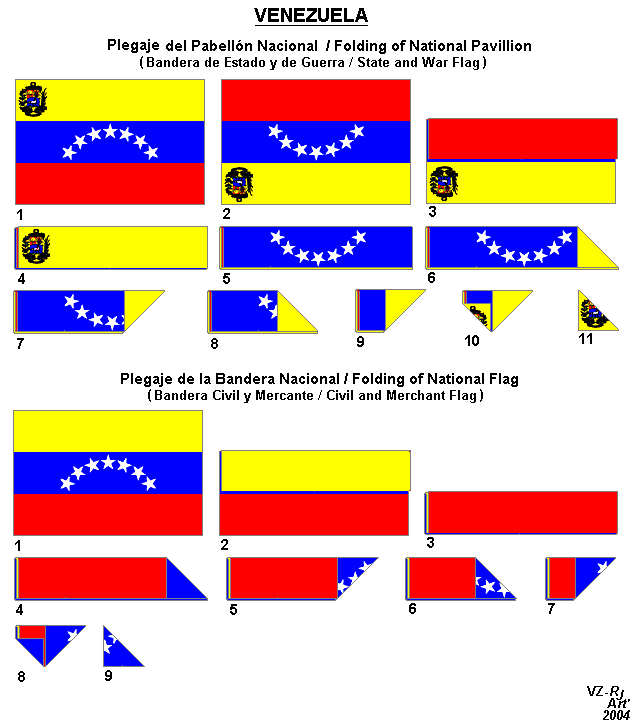
by Raul Orta, 9 July 2004

Last modified: 2004-07-17 by dov gutterman
Keywords: venezuela |
Links: FOTW homepage |
search |
disclaimer and copyright |
write us |
mirrors
See also:
Exist nations which have the custom of folding in particular
way hoisting flags to keep them. In Venezuela it’s
proceeding following way:
- State & War Flag (National Pavilion): the field is extends
by its four ends and the thirds are arranged such a way that red
is disposed on the blue and on that, the yellow one. Soon it’s
begun triangular folding step by step from the fly until hoist
edge can be introduced in the final lapel, so that the cloth is
involved itself with yellow and National Coat of Arms visible.
- Civil & Merchant Flag: on the blue stripe is placed the
yellow and on this, the red one to bend in identical way to the
previous one, but the visible color must be blue, noting or not
the stars.
Some voluntary organisms - Scouts, for example - usually folds
the VE Flag still on the hoist in camping periods and involved
itself, is arise to the top such a way that it makes possible to
unfold it with pull instead hoisting it on dawn. This practice,
internationally admitted in this type of organizations, can be
reminding of a similar military custom.
It’s very little that is known about origin of this practice
in our country and is highly probable that it’s a local
adaptation of similar customs applied into countries like United
States, where originated this singular form to conserve the
hoisting flags. However, the singularity of the process in
Venezuela is that it varies according the character of the Flag,
since we have already seen before. It’s very possible that
National Pavilion’ folding has arisen into Armed Forces
whereas the one of National flag has been generated as Scout
practice and from there, its distinction.
It’s possible to add that aside from already indicated, the
folding of National flag doesn’t have additional semiology
as for example, the United States, where some traditions exist
which assign to each fold a particular meaning.
At the moment, in Venezuela the folding of our National flag is a
practice not very extended but step by step has come receiving
importance when being understood that it’s a personalization
of the Homeland and that as so, deserves a particular treatment
that differs naturally with its material nature.
Raul Orta, 9 July 2004